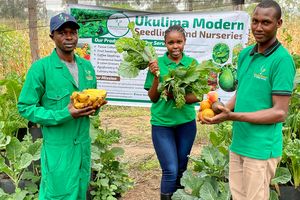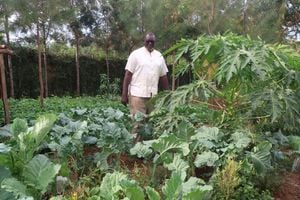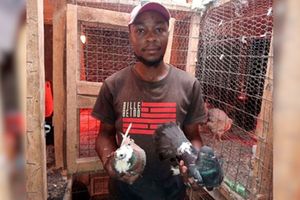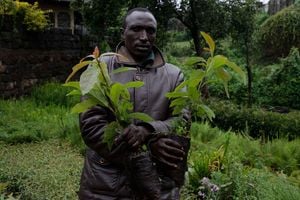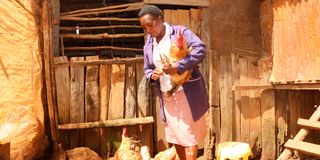
Purity Ntaragwi from Umande ward in Laikipia County feeds her chicken reared in an innovative brooder.
The village of Umande in Laikipia County is a testament to the resilience and innovation of subsistence farmers.
With its dry, arid landscape, the region faces significant challenges - most notably deforestation driven by population pressure and the search for resources.
According to Global Forest Watch, from 2001 to 2023, Laikipia's tree cover has decreased by 7.52 kha, a 16 per cent decline since 2000 and accounting for 1.9 per cent of the total tree cover loss in Kenya.
A major factor contributing to this loss is the use of forest resources for fuel. But in the midst of these trials, some local farmers in the area are inventing ways to incorporate sustainability into their practices.
One of these determined farmers is Purity Ntarangwi, who embodies the spirit of adaptability and sustainable agriculture. On a busy morning, we find her tending to her three-day-old chicks in her small compound, a sight that demonstrates her commitment to both her family and the environment.
Ntarangwi's approach to poultry farming is unique: she uses a chepkube — an innovative, environmentally friendly brooder designed to optimise both heat for her chicks and cooking space for her household.
She explains that to make an artificial chepkube you need blocks, tree branches, sand and some mud to smear on top of the brooder.
The chepkube is ingeniously designed with two distinct sections: one for the chicks, which provides the necessary warmth and protection, and the other, which serves as a traditional cooking stove.
"It's not just a stove; it's a solution to many problems, because it reduces the need for firewood, which means fewer trees are cut down for fuel. This in turn helps combat deforestation and climate change," she explains.
Her statement highlights a pressing reality for many here, where reliance on firewood for cooking is commonplace.
Sammy Simiyu, a public health specialist, points out that traditional cooking methods often lead to respiratory problems due to smoke inhalation.
The chepkube, on the other hand, emits limited smoke, protecting her family's health from diseases such as asthma and chronic chest problems.
Aside from the health benefits, the efficiency of the chepkube also helps Ntarangwi make the most of her time.
"I can cook several meals at the same time with just three pieces of firewood," she explains, highlighting the device's practicality.
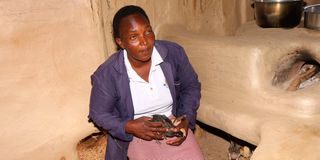
Purity Ntaragwi feeds firewood into a 'chepkube' an innovative brooder used to rear one day-old chicks.
As well as conserving resources, it gives her more time to look after her growing flock of 200 indigenous chickens.
Ntarangwi's chickens are an important source of income. "After 21 days, I sell the chicks, which is an important supplement to my family's diet and finances," she explains. The cycle of caring for and selling these birds supports her family's needs, allowing them to remain food secure despite the region's challenges.
Through her efforts, she is not only nurturing her chicks, but also a new generation of environmentally conscious farmers in Umande village.
"At the moment, subsistence farmers here are becoming increasingly aware of the environmental impact of their practices," she adds.
And so, with ongoing training and support from agricultural organisations, many local farmers are beginning to explore alternative energy sources and more sustainable farming practices, increasing the potential for widespread change in this area.
Ntarangwi learned how to build the artificial brooder in 2022, a concept she adopted from women in West Pokot. Since then, her business has grown into an agribusiness with more than 50 chicks and 200 hens at various stages of development.
She is part of a group of 20 women who also make chepkubes for other poultry farmers in the area.
"The chepkubes have brought significant empowerment, as the women have enough money to contribute to their savings groups and help their husbands meet household needs," she explains.
Agnetta Aleyo, a gender and climate-smart agriculture specialist with the Food and Agriculture Organization (FAO) in Kenya, who works in Laikipia, notes that the programme has contributed to a reduction in domestic violence in many households.
She also highlights a change in attitudes, with men now supporting their wives to attend training on resilience and climate-smart agriculture.
"The change in attitude is clear, and women are now active participants in the value chain, speaking out without fear and being heard," adds Aleyo.
Meanwhile, Ntarangwi speaks of her desire to educate other farmers, not only in her area but across the country, about sustainable practices and innovative technologies like the chepkube.
"If we can all adopt these methods, we can help our community thrive while protecting our environment."

